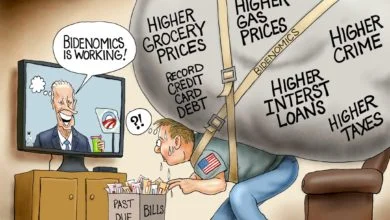Inflation is tame in May, but likely to accelerate. Fed must raise rates again.
According to the Bureau of Labor Statistics, the Consumer Price Index (CPI) increased by only .1% in May. For the last 12 months, the inflation rate was 4%. That is the lowest number we have seen since March 2021. That will allow the Fed to pause their rate hikes when they meet later this week. The pause may be a mistake.
The core inflation rate, which removes food and energy prices, rose .4% in May which means the 12-month core inflation rate was 5.3%. That number should put pressure on the Fed to raise rates another 25 basis points. Failure to do so will make the fight to reduce inflation to an acceptable level, much tougher.
A close look at the difference between the May CPI and the core rate explains why the Fed should raise interest rates. Food prices were relatively constant, showing only a .1% increase. But overall energy prices fell by 3.6%. Based on recent activity in the energy market, the price decrease is not likely to continue.
The price of oil fell 7.7% in May. That is the sixth consecutive monthly decline. In the last 12 months, oil prices have fallen by a whopping 37%. That large decrease has kept consumer price inflation to the current 4% level.
But what will happen to oil prices in the future?
The US continues to have a policy of reducing oil production. OPEC decided to cut production by more than a million barrels a day last April. Analysts expected oil prices to jump by 10%. That didn’t happen and in fact oil prices fell.
Just last week Saudi Arabia pledged to cut production by another one million barrels per day. Oil prices did rise initially but the price increase has eased somewhat. The higher oil price means the June CPI will be much higher than we saw in May.
There are three reasons why oil prices fell this year.
The overall economic worldwide activity is slowing, which is reducing worldwide demand for oil. That reduction in Demand is keeping oil prices down. But it is China and Russia that are having the greatest impact on oil prices.
China completely shut down its economy last fall as it adopted a zero-COVID policy. They ended that policy and expected their economy to rebound to the high growth they have enjoyed for the last decade or so.
But it proved to be very difficult to just flip the switch and have their economy return to normal. The sluggish demand from the world’s second-largest economy put downward pressure on oil prices.
Russia who pledged to OPEC that they too would cut production as part of the April announcement has apparently not done that. Although there have been sanctions placed on the purchase of Russian oil, both China and India have ignored the sanctions and continue to purchase large amounts of Russian oil, often at a discounted price.
Russia today is producing and selling more oil than the did before the Ukraine invasion.
The low demand worldwide and the increase in supply from Russia have resulted in falling energy prices. That will portably not last too much longer. OPEC is determined to see oil prices rise to the $90 to $100 per barrel range.
When energy prices rise in the coming months and with the core inflation rate above 5%, the CPI will rise. The Fed should look at the overall strength in the job market to see that the economy is still overheated meaning further rate hikes are necessary.
Interest rates are still too low to discourage consumers from buying big ticket items which require financing. In May and looking at the last few previous months, both shelter costs and car prices have risen. Although new vehicle prices have stabilized, used car prices rose 4.4% in May.
Shelter prices increased .6% in May and are up by 8% for the last twelve months.
All of this means the Fed should raise the Federal Funds Rate (FFR) by at least 25 basis points in their June meeting. As I have said for more than a year now, the FFR which is currently just above 5% must reach 6% to end this inflation problem. The sooner we get there, the better.
Agree/Disagree with the author(s)? Let them know in the comments below and be heard by 10’s of thousands of CDN readers each day!




